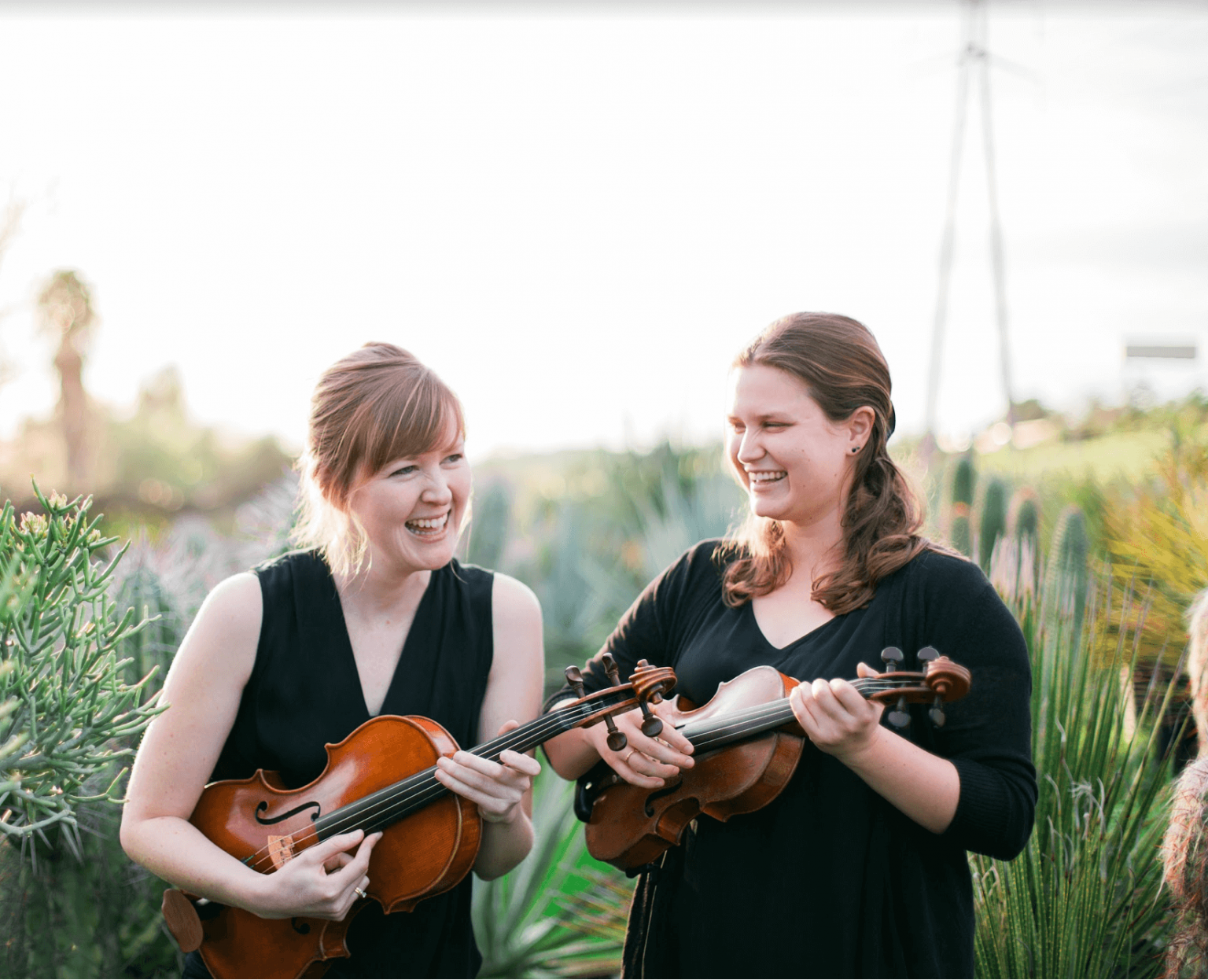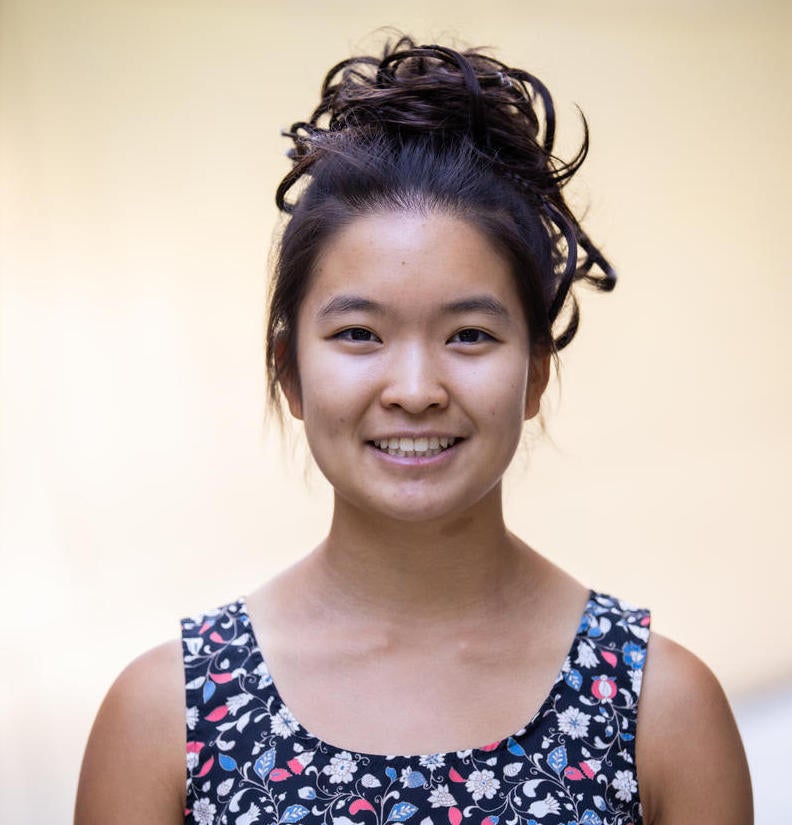
Aperture Duo, Concert of Student Works
The UCLA Herb Alpert School of Music, the Department of Music, the Joyce S. and Robert U. Nelson Fund, and the Hugo and Christine Davies Fund for Contemporary Music present an evening concert of student works, performed by the Aperture Duo.
Performers & Composers

Sydney Wang
See Bio
Sydney Wang (b. 2002) is a Los-Angeles based composer and pianist. The recipient of a 2017 BMI Student Composer Award, Sydney has been commissioned by ensembles including the Pasadena Symphony, the Modesto Symphony, and the Hypotenuse Trio. In addition, her works have been recorded by the Los Angeles Philharmonic, Sandbox Percussion, Lyris Quartet, and pianist Stefano Greco, among others. From 2017-2021, Sydney was a composer fellow in the Los Angeles Philharmonic’s Nancy and Barry Sanders Composer Fellowship Program. Most recently, her string quartet The Book of Hours was performed and recorded by the Carpe Diem String Quartet in July 2022.
Sydney currently studies composition with Professor Richard Danielpour and piano with Professor William Kinderman at UCLA, where she actively collaborates with artists as both a composer and performer. Recently, Sydney joined Through the Staff, a nonprofit organization dedicated to providing free music education to communities in need. She believes that music has the ability to change the world, and that every person should be given the opportunity to experience the transformative power of music.
Repertoire
Sydney Wang, A Ghost Story
Madeline Barrett, Mosaic
Carlos A. Durán, Verschlimmbesserung
Jonathan Wu, Serenade
Celina Anna Kintscher, (dis)placed
- Intermission -
Austin Ali, Game of Heads
Morgan Kelly Moss, Invocation
Sergey Nesterov, Prayer for the Little Dove
John Hollywood, Ufffff
Alex Barsom, When I Consider how My Light is Spent
Program Notes
“a ghost story.” All of us are haunted by ghosts – ghosts of lost loves, of distant desires, of fruitless endeavors and forgotten dreams. Now and again they emerge from the shadows to knock on our doors at midnight. And each time they appear, we insist on banishing them back to the darkness. After all, that is where ghosts belong, is it not? Those painful memories, those buried thoughts are bittersweet reminders of what has been, or what could have been. We push them away to the farthest corners of our minds, lock them up in a box, and throw away the key in the hopes of one day forgetting them altogether.
But what if ghosts aren’t meant to be forgotten?
“Ghosts are guilt, ghosts are secrets, ghosts are regrets and failings. But most times, a ghost is a wish.” ~ Steven Crain, The Haunting of Hill House
What if, instead of running back to our beds in terror when our midnight visitors come knocking, we open the door and welcome them in? What if, instead of seeing them as foes to be vanquished, we embrace them gently as friends? What if, instead of cowering away from their touch, we allow them to take us by the hand? In dancing with our ghosts, we find in them beautiful and neglected parts of ourselves, aching to be cherished and loved.
Mosaic, a collection of short movements for violin and viola duo, is inspired by the mosaic visual art form and the concept of bringing together small pieces to create a larger image. I considered this concept on both a small and large scale, utilizing small, varying musical cells to create each movement, as well as connecting contrasting movements to create the overall image of the work.
Verschlimmbesserung is a German word that translates to “an attempted improvement that only makes things worse.” I got inspired by questioning myself what the cause of this phenomenon could be. Perhaps a bad business deal, a not so good advice, romance…?
This piece exists as a personal reminder of embracing the absurd in our own endeavors, of treating myself and others kindly when looking to the past, and in general, to reflect on how our plotting against the universe usually does not give us the result we expect.
Though negative connotations of both the word and the music are expected, I invite you to explore the plethora of fragile emotions hidden behind one word and remember that time you also experienced verschlimmbesserung. Thank you for listening.
Serenade. I’ve always been intrigued by the interpersonal aspect of chamber music, and I aim to magnify that element in this piece. Within the intimate settings of a duet, I want to allow the performers generous amounts of freedom and to have fun with the music. Upon discovering Adrianne and Linnea's stellar musicianship, I also included many adventurous passages, all while striving to maintain the integrity of the instrumentation.
(dis)placed. Inspired by the Aperture Duo, Celina Anna Kintscher composed this piece featuring violin, viola and body percussion titled “(dis)placed.” Each of the three movements represent a distinct time period: The first movement, “IT WAS,” represents a dark and daunting past. The second movement, “IT IS,” (which will not be performed at this concert) embodies a brighter, more playful present. The third movement, “IT WILL BE,” discovers imagery of an uncertain yet hopeful future.
Game of Heads involves a musical quarter which, depending on whether it spins heads or tails, determines the music that the violin and viola will play. The quarter becomes a musical instrument itself in the composition because the violin and viola respond to its motion through their improvisation.
Invocation is a piece inspired by two halves of a person; the half that pulls us forward, and the half that holds us back. The piece paints the picture of a distressed soul, straining to get out of the same negative cycle. Sometimes, this stress can be so great that we turn to our mothers and fathers for help, and perhaps even God. Though the emotional tension in the music is real and tangible, there will always remain a glimmer of hope, and there is beauty through every human experience.
“Prayer for the Little Bird” is a piece for violin and viola based on a religious Greek Orthodox chant. The music, especially in the beginning, presents an emotionally austere, ascetic picture, while letting go emotionally towards the golden ratio point, and then closing down again towards the ending. Performance is supposed to be quite free in terms of rhythm and tempo, with generous rests (“breaths”) between the phrases in the chant-like sections. Musical text includes microchromaticisms and microchromatic embellishments that are meant to be interpreted freely, as if it is partly improvisatory.
Ufffff. This piece explores a particular distorted string sound that is achieved with light left hand pressure and excessive vibrato. The middle section of the piece is inspired by traditional American fiddle music. The work’s title is open to interpretation.
When I Consider how My Light is Spent. This piece was inspired by John Milton's poem of the same name, in which he confronts the tragic loss of his sight in the middle of his life. A devout protestant, Milton believed that, although his blindness would fetter his ability to fulfill his god-given talent of writing, he was still able to serve God. I distilled a much simpler, more vague meaning from this poem by extracting text from the first and last lines, which, when isolated, convey a stark image of being shocked by the sudden loss of sight, and a confusion caused by this new state of being. The text is much less conclusive this way, and the listener is not left reassured, but rather immersed too in the same void Milton would have experienced. This way, the audience is not guided to the closure that Milton provides in his poem. Instead, we are left to simply feel a sense of loss, and draw from it our own conclusions. We should then not contemplate only the sensory loss of sight, but any loss that one might experience. Should we be able to find clarity and acceptance in the wake of loss, just as Milton does?